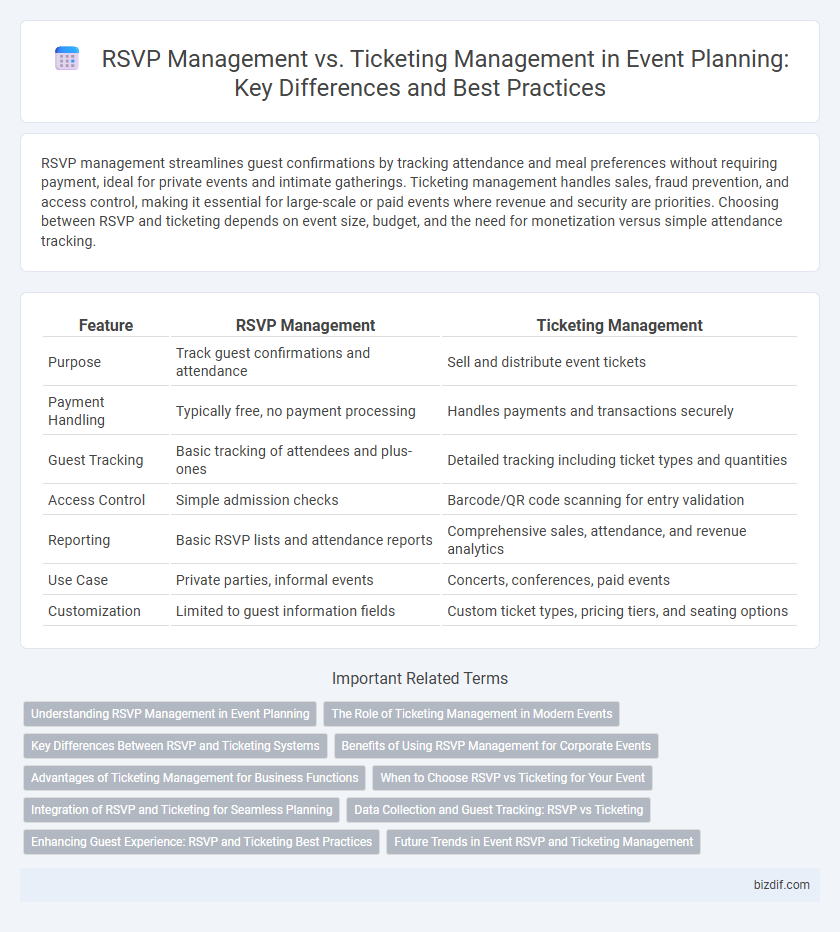RSVP management streamlines guest confirmations by tracking attendance and meal preferences without requiring payment, ideal for private events and intimate gatherings. Ticketing management handles sales, fraud prevention, and access control, making it essential for large-scale or paid events where revenue and security are priorities. Choosing between RSVP and ticketing depends on event size, budget, and the need for monetization versus simple attendance tracking.
Table of Comparison
| Feature | RSVP Management | Ticketing Management |
|---|---|---|
| Purpose | Track guest confirmations and attendance | Sell and distribute event tickets |
| Payment Handling | Typically free, no payment processing | Handles payments and transactions securely |
| Guest Tracking | Basic tracking of attendees and plus-ones | Detailed tracking including ticket types and quantities |
| Access Control | Simple admission checks | Barcode/QR code scanning for entry validation |
| Reporting | Basic RSVP lists and attendance reports | Comprehensive sales, attendance, and revenue analytics |
| Use Case | Private parties, informal events | Concerts, conferences, paid events |
| Customization | Limited to guest information fields | Custom ticket types, pricing tiers, and seating options |
Understanding RSVP Management in Event Planning
RSVP management in event planning focuses on tracking guest responses to invitations, ensuring accurate headcounts and effective communication. It allows planners to gauge attendee interest, manage seating arrangements, and customize event experiences based on confirmed participants. Unlike ticketing management, which primarily handles sales and payment processing, RSVP systems prioritize guest confirmation and attendance monitoring.
The Role of Ticketing Management in Modern Events
Ticketing management streamlines the entire attendee experience by automating ticket sales, tracking attendance, and providing real-time analytics, essential for large-scale or paid events. Unlike RSVP management, which primarily tracks guest confirmations, ticketing systems integrate payment processing, fraud prevention, and access control, enhancing security and operational efficiency. Modern event organizers rely on ticketing management platforms to optimize revenue, improve marketing strategies, and deliver seamless entry experiences through digital and mobile ticket options.
Key Differences Between RSVP and Ticketing Systems
RSVP management focuses on gathering guest confirmations to estimate attendance without involving payment processing, while ticketing systems handle sales, payment transactions, and seat assignments for events. RSVP systems typically offer simpler response tracking and reminder capabilities, whereas ticketing platforms provide comprehensive tools for inventory control, revenue reporting, and access control. Understanding these distinctions helps event planners choose the most suitable solution based on their event's priorities, whether emphasizing guest count accuracy or monetization and entry management.
Benefits of Using RSVP Management for Corporate Events
RSVP management streamlines guest tracking by allowing precise headcounts and real-time updates, crucial for corporate event logistics and budgeting. It enhances personalized communication, ensuring targeted invitations and timely reminders, which boost attendee engagement and reduce no-shows. Unlike general ticketing systems, RSVP tools prioritize invitation-only guest control, offering better security and exclusivity tailored to professional settings.
Advantages of Ticketing Management for Business Functions
Ticketing management streamlines event entry by automating sales and tracking attendance, which enhances revenue forecasting and resource allocation. It provides valuable data analytics on customer purchasing behavior, enabling targeted marketing and improved event personalization. Integrating payment processing within ticketing platforms reduces administrative overhead and accelerates cash flow for business functions.
When to Choose RSVP vs Ticketing for Your Event
RSVP management suits intimate or free events where guest count control is essential but payment collection is unnecessary, ensuring accurate headcounts for catering and seating. Ticketing management is ideal for paid or large-scale events requiring secure access control, revenue tracking, and detailed attendee data. Selecting RSVP over ticketing depends on event goals, guest engagement level, and whether transactional processing is needed.
Integration of RSVP and Ticketing for Seamless Planning
Integration of RSVP and ticketing systems streamlines event planning by consolidating guest data and attendance tracking in a single platform. This unified approach reduces manual errors, enhances communication with attendees, and provides real-time insights into event capacity and ticket sales. Efficient integration supports personalized experiences and resource allocation, optimizing overall event execution and attendee satisfaction.
Data Collection and Guest Tracking: RSVP vs Ticketing
RSVP management collects guest responses to confirm attendance, enabling accurate headcounts and meal preferences, while ticketing management records purchases and entry validation for paid or limited-access events. RSVP systems focus on tracking individual guest status, dietary restrictions, and plus-ones, facilitating personal communication before the event. Ticketing platforms provide detailed data on sales metrics, entry times, and seat assignments, optimizing crowd control and revenue analysis.
Enhancing Guest Experience: RSVP and Ticketing Best Practices
Effective RSVP management ensures accurate guest count and personalized communication, reducing wait times and enhancing overall event satisfaction. Ticketing management streamlines entry with secure, digital ticket validation, minimizing fraud and improving check-in speed. Combining both practices allows event planners to anticipate attendance, tailor guest interactions, and deliver a seamless, engaging experience.
Future Trends in Event RSVP and Ticketing Management
Future trends in event RSVP and ticketing management emphasize automation through AI-driven personalization, enhancing guest experience and operational efficiency. Integration of blockchain technology offers secure, transparent transactions, reducing fraud and enabling seamless ticket transfers. Mobile-first platforms with real-time analytics provide event organizers with actionable insights for dynamic capacity planning and targeted marketing strategies.
RSVP management vs Ticketing management Infographic

 bizdif.com
bizdif.com